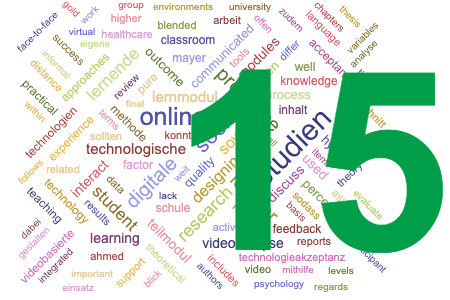15. Issue December 2023

- Summary
- Effective design of digital learning offers is the basis for their acceptance and successful usage. This issue provides an insight into adult learners’ perceptions on e-Learning courses related to healthcare in Africa, the design of a video-based learning module to promote the professional recognition of relevant classroom management events, and a learning design that focuses on learning about Augmented Reality in computer science classrooms.
- Zusammenfassung
- Das effektive Design digitaler Lernangebote ist eine Voraussetzung für deren Akzeptanz und Nutzung. Diese Ausgabe gibt Einblick in die Wahrnehmung von e-learning Gesundheitskursen durch erwachsene Lerner in Afrika und präsentiert das Design eines videobasierten Lernmoduls zur Förderung professioneller Wahrnehmung von klassenführungsrelevanten Ereignissen im Unterricht sowie ein digitales Lerndesign für das Lernen über AR im Informatikunterricht.
Editorial
Effective design of digital learning offers is the basis for their acceptance and successful usage. This issue presents a scoping review that provides an overview of studies that integrate adult learners’ perceptions on e-Learning courses related to healthcare in Africa. Secondly, results of research into the design and acceptance of digital learning environments of two forms are provided: a video-based learning module to promote the professional reception of relevant classroom management events, and a learning design that focuses on learning about AR in computer science classrooms. To support effective design, a model for the participatory design of digital learning offers and a framework for investigating technology acceptance of immersive virtual environments are discussed. Empirical investigations toward understanding, modeling, and enhancing social presence in online distance learning environments are presented that aid the design of online learning environments. Finally, eight book descriptions provide an insight into newly published books in our area.
Lessons from e-Learning courses in healthcare in Afrikca
In their article “Lessons from e-Learning courses in healthcare“ Dana Gaigulo, Marika King and Juan Bornman used a scoping review to provide an overview of studies that integrate adult learners’ perceptions on e-Learning courses related to healthcare. They identified quality of structure, process, outcome and the influence of initial expectations on process and outcome quality as most influential. These should be taken into account when designing e-Learning courses for healthcare practitioners that integrate the adult learner’s perspective.
Design and acceptance of digital learning environments
Jennifer Janeczko, Robin Junker and Manfred Holodynski present in their article “Entwicklung eines digitalen, videobasierten Lernmoduls zur Förderung der professionellen Wahrnehmung von Klassenführung bei angehenden Lehrkräften“ the development of a digital, video-based learning module to promote the professional recognition of relevant classroom management events. Its usability was evaluated in terms of content, operability, and aesthetics. Their findings may support the construction of future video-based learning modules.
Josef Buchner and Marc Lachmann discuss in their project report “Die Entwicklung einer Augmented Reality Anwendung durch Lernende im Informatikunterricht: Didaktisches Design und Lessons Learned“ the development of a learning design that focuses on learning about AR in computer science classrooms. At its core is a project where students develop an AR application using the Vuforia Studio software, that visualizes safety instructions in the school's makerspace. Other teachers, who want to implement their own AR development projects, may use the learning design as a template.
Mathias Teine presents in his dissertation “Zur partizipativen Gestaltung von (digitalen) Lernangeboten in der betrieblichen (Weiter-)Bildung: eine empirische Modellentwicklung” a model for the participatory design of digital learning offers, which includes practical recommendations and accompanying materials that support the transfer of the underlying theory and findings into the practice of designing (continuing) vocational education.
Carolin Pletz examines in her dissertation „ Technologieakzeptanz von virtuellen Lern- und Arbeitsumgebungen“ how acceptance of immersive virtual reality environments used in work and learning can be assessed. Results indicate that the Technology Acceptance Model can be used, and further user-related, organisational and technology-specific factors influencing technology acceptance for the use of IVR in teaching-learning contexts are identified.
Joshua Weidlich characterizes in his dissertation „Presence at a distance: Empirical investigations toward understanding, modeling, and enhancing social presence in online distance learning environments” social presence as a complex psychological phenomenon that is multi-causally determined and nuanced in terms of its benefits for online distance learning.
Book Descriptions
„Digitale Medienwelt und Pädagogikunterricht“ is a new book by Alexander Martin, Stephan Wedding and Jörn Schützenmeister that describes how classes in education may be shaped to help pupils to recognize opportunities and risks of digital media in education.
Birgit Brandt, Leena Bröll and Henriette Dausend present in their book “Digitales Lernen in der Grundschule III“ the proceedings of the third Symposium of “learning digitally” at the TU Chemnitz.
Martin Weller’s new book „Metaphors of Ed Tech” uses metaphors as mental models to enable educators to move beyond pragmatic concerns into more imaginative and playful uses of technology.
Kylene M. Butler discusses Anwar Ahmed’s new book “Exploring Silences in the Field of Computer Assisted Language Learning”. According to her, this book emphasizes the potential and risk of computer assisted language learning in the classroom and addresses researchers, technology developers, educators and in-service teachers.
As editors of the book “Critical Digital Pedagogy in Higher Education”, Suzan Köseoğlu, George Veletsianos and Chris Rowell argue for a pedagogy of care in an online environment, instead of reducing learning to a transaction.
Jon Dron articulates in his book “How Education Works: Teaching, Technology, and Technique” a new theory that treats education as a technological phenomenon, encouraging anyone in an educational system to see what they do in a different and, hopefully, more productive and creative way.
In their new book “Principles of Blended Learning: Shared Metacognition and Communities of Inquiry“ Norman D. Vaughan et al. further explore and refine blended learning principles with an added focus on designing, facilitating, and directing collaborative blended learning environments by emphasizing the concept of shared metacognition.
Jörg Zumbach et al. present in their book “Digitale Medienbildung: Pädagogik – Didaktik – Fachdidaktik“ a collection of chapters highlighting the state of the art in media pedagogics and media didactics as well as providing recommendations for practitioners.
Joerg M. Haake
Editor-in-Chief, eleed


